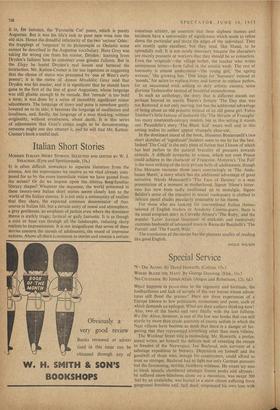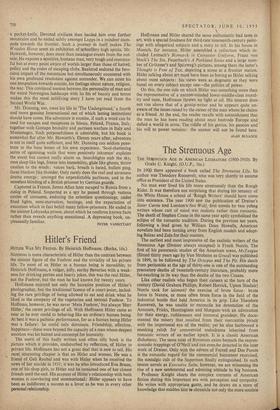Special Service
DIE \ALONE. By David Howarth. (Collins, 15s.) WHERE BLEED THE. MANY. By George Dunning. (Elek, I 6s.)
WHAT happens in peace-time to the ingenuity and fortitude, the foolhardiness and lack of scruple of the war heroes whose adven- tures still flood the presses? Here are three experiences of a Europe known to few politicians, economists and poets, each of which demands an epilogue. What are their authors thinking now? Alas, two of the books end very finally with the last fullstop. We Die Alone, however, is one of the few war books that can still startle by more than crude accounts of enemy sadism in which the Nazi villains have become so stock that there is a danger of for- getting that they represented something other than mere villainy. a pocket-knife. Devoted civilians then hauled him over further mountains and he ended safely amongst Lapps in a reindeer stam- pede towards the frontier. Such a journey in itself makes The Wooden Horse seem an exhibition of schoolboy high spirits. Mr. Howarth, however, does more than catalogue events from the out- side. He exposes a sensitive, humane man, very tough and resource- ful but at every point aware of worlds larger than those of hatred, policy and the codes of escaping clubs. Baalsrud endured the fero- cious impact of the mountains but simultaneously countered with his own profound resolution against surrender. We can enter his one temptation towards suicide, his feelings about nature, religion, the war. This continual tension between the personality of man and the weird Norwegian landscape with its fits of beauty and terror makes this the most satiifying story I have yet read from the Second World War.
Mr. Dunning, too, owes his life to 'The Underground,' a fourth and more genuine International out of which lasting institutions should have come. His adventure is routine, if such a word can be used for escapes and recaptures in Silesia, Poland, France, Italy, together with Gestapo brutality and partisan warfare in Italy and Montenegro. Such purposefulness is admirable, but his book is somewhat flat after Mr. Howarth's. Eleven years after, adventure is not in itself quite sufficient, and Mr. Dunning can seldom pene- trate to the bare bones of his own experience. 'Soul-shattering series of agonising wails that were positively inhuman' explains the event but cannot really alarm us. Searchlights stab the sky, men sleep like logs, freeze into immobility, glide like ghosts, throw caution to the winds : voices bark, breath is bated, bulletS ping, faces blacken like thunder. Only rarely does the real and atrocious drama emerge: amongst the unpredictable partisans, and in the senseless blinding of a British prisoner by German guards.
Captured in France, James Allan later escaped to Russia from a stalag in Poland. Suspected as a spy he passed through various circles of unreason, enduring the relentless questionings, under fixed lights, semi-starvation, beatings, and the expectation of execution which in fact befell many fellow-prisoners. He ended in the sinister Lubyanka prison, about which he confirms known facts rather than reveals anything sensational. A depressing book, un- pleasantly familiar.
PETER VANSITTART











































 Previous page
Previous page